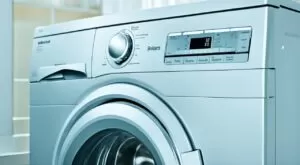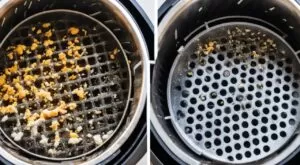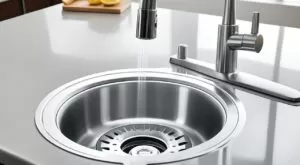Keeping our homes clean includes caring for the appliances we use daily. Especially in the kitchen, descaling the dishwasher is essential. This not only keeps your dishes shining but also ensures your dishwasher runs smoothly. Regular care extends your dishwasher’s life and performance. With proper cleaning tips, your dishwasher will work well, keeping the kitchen’s heart strong.
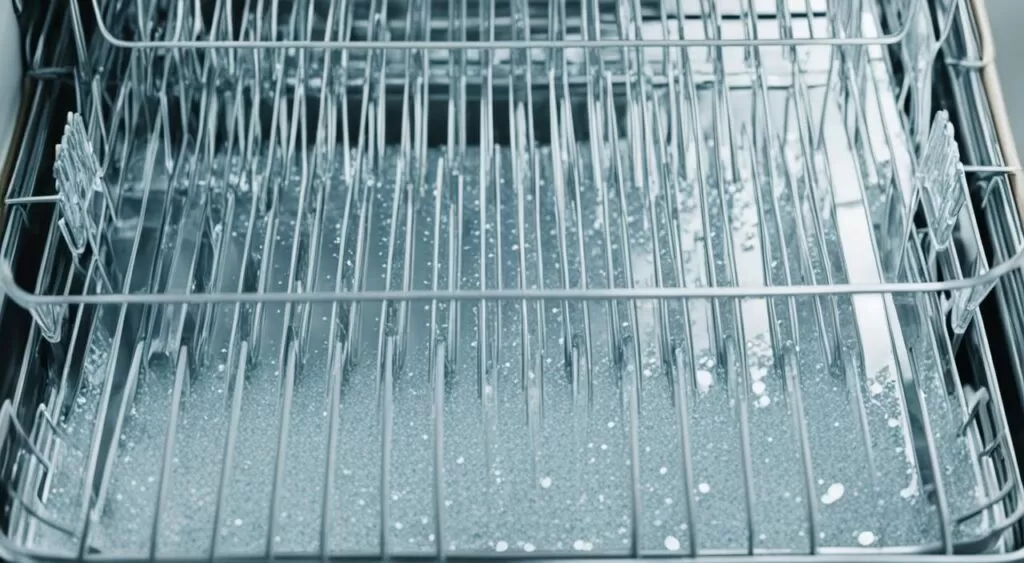
Key Takeaways
- Keep the dishwasher temperature between 130-140°F for maximum effectiveness.
- Clean the dishwasher filter weekly to prevent food particles from sticking to clean dishes.
- Engage in a deep cleaning process monthly to remove mineral buildup and detergent residue.
- Use high-quality dishwasher detergents for a residue-free clean.
- Regularly clean the door gasket and dispenser to avoid unpleasant odors and residue.
- Vinegar is an effective and safe cleaning agent for a fresh-smelling, bacteria-free dishwasher.
- Consult your dishwasher model’s features, like Maytag®’s Dual Power Filtration, for specific maintenance guidance.
The Importance of Routine Dishwasher Maintenance
Maintaining your dishwasher well means more than fixing things when they break. It means taking steps to prevent dishwasher residue and scale. This approach leads to cleaner dishes and a longer life for your appliance. Keeping up with maintenance stops debris from clogging your machine, keeping it running smoothly.
The Relationship Between Maintenance and Dishwasher Efficiency
Routine maintenance is key to your dishwasher’s performance. Dishwasher efficiency improves with good care. Cleaning the dishwasher well a few times a year is crucial for it to work its best. Using it often also helps keep it clean and reduces the need for deep cleans.
Preventing Residues and Scale Buildup Through Regular Care
Removing scale isn’t just for looks; it keeps your dishwasher working well. Essential dishwasher cleaning hacks help stop scale. Simple steps like running it with vinegar and baking soda stop residue and clogs. This keeps your dishes clean and your system clear.
- Regular cleaning every 30 days is recommended to deter detergent buildup.
- Filter cleaning every three to six months, depending on usage, can prevent clogs and maintain peak performance.
- For effective DIY maintenance, turn to white vinegar and baking soda to keep the dishwasher spotless and functioning smoothly.
| Maintenance Task | Frequency | Benefits | Recommended Products |
|---|---|---|---|
| Comprehensive Cleaning | Every few months | Optimal performance, increased efficiency | Arm & Hammer Baking Soda, Distilled White Vinegar |
| Regular Use & Rinse | Daily Use | Prevents debris buildup | Dishwasher-safe Detergents |
| Drain Maintenance | As needed | Prevents clogs, maintains cleaning efficiency | Commercial Drain Cleaners |
| Filter Cleaning | Every 3-6 months | Prevents odors and blockages | Warm soapy water |
| Exterior Cleaning | Monthly | Enhances overall cleanliness & hygiene | Therapy Clean Stainless Steel Cleaner & Polish |
The outside of your dishwasher needs attention too. Keeping the exterior clean is vital, especially for stainless steel models. Using products like Affresh Dishwasher Cleaner and Therapy Clean Stainless Steel Cleaner & Polish will make every part of your dishwasher shine, both inside and out.
Identifying the Signs of Dishwasher Scale Buildup
Being proactive with dishwasher maintenance is crucial. It helps fight hard water stains that hurt your dishwasher’s performance. A sure sign of buildup is when your glassware loses its shine and dishes turn cloudy. This problem means it’s time to remove hard water stains from dishwasher interiors. If ignored, these mineral deposits can make your dishwasher less effective.
To keep your dishwasher running smoothly, tackle the main issues: food bits, grease, soap scum, and hard water residue. If not cleaned, these can cause bad smells and even lead to more serious problems like blocked drains. To prevent these issues, it’s good to deep clean your dishwasher a few times each year.
An immediate solution is using a sanitize cycle, which can reduce 99% of bacteria on dishes. Adding 1 cup of vinegar can also help with mineral stains. For a targeted fix, Finish® Dishwasher Cleaner is great at removing deposits. Citric acid is a natural option for those preferring eco-friendly cleaners.
- Proper loading techniques help avoid buildup and ensure clean dishes.
- How you arrange items in the lower rack impacts cleaning effectiveness.
- Spacing utensils in the basket helps jets clean each item well.
If your dishwasher won’t drain, check the filter and sump for clogs. If the problem remains, professional help might be needed. Regular cleaning and maintenance, like using Finish®, can keep your dishwasher free from blockages.
Dishwashers are important for their convenience and affordability. By maintaining your dishwasher properly, you can keep it running well and avoid hard water problems.
Choosing the Right Descaling Product for Your Dishwasher
To make sure your dishwasher lasts more than 10 years, routine care is key. This includes choosing the right descaling products. You can pick from things like vinegar and baking soda or commercial cleaners. These are made to remove lime scale and detergent buildup.
Understanding Water Hardness and Its Impact on Descalers
Water hardness affects how well descalers work. Hard water, with lots of minerals, can cause dull glassware and weak detergent. To fix this, clean your dishwasher often, use more detergent, or choose detergents that soften water.
The Role of Dishwasher-Specific Descalers
Dishwasher-specific descalers are made to clean your dishwasher thoroughly. They help a lot with hygiene and filter odors. Using products like Affresh Dishwasher Cleaner works well during normal wash cycles.
Starting with homemade solutions like vinegar in hot water can help keep your dishwasher clean. Also, using products like Therapy Clean Stainless Steel Cleaner & Polish, Arm & Hammer Baking Soda, and Distilled White Vinegar keeps both inside and outside clean.
| Cleaning Agent | Usage | Frequency | Benefits |
|---|---|---|---|
| White Vinegar | Run through a hot water cycle | Every 30 days | Removes grease, grime, and odors |
| Baking Soda | Sprinkle on bottom, run hot water cycle | As needed | Freshens the dishwasher |
| Commercial Descaler (Affresh) | Add to a normal load | Every 1-6 months depending on use | Effectively descales and removes buildup |
| Specialized Cleaners (Therapy Clean) | Apply to interior and exterior | For deep cleaning sessions | Cleans and polishes stainless steel surfaces |
It’s vital to check your dishwasher for blockages often. Knowing how and when to run self-cleaning cycles is also important. By following these steps, you can descale the dishwasher well. The cleaning might take from five minutes to an hour, depending on the need for a deep clean.
Descaling the Dishwasher: Tips to Eliminate Residues and Maintain Efficiency
Keeping your dishwasher in top shape is key for its lifespan and for clean dishes. Descaling the dishwasher is important to get rid of food bits and scale. It’s best to clean it every 30 days to stop soap scum and keep it working well.
Cleaning parts like the filter depends on how much you use it and if you pre-rinse dishes. For cleaning dishwasher tips, many recommend vinegar and baking soda for a thorough clean. But, be careful, as some dishwasher makers warn that vinegar might harm delicate parts.
Dishwasher care is not only about keeping it clean. It also means dealing with hard water in your area. Hard water makes detergent work less well and can leave marks on glasses. So, if you have hard water, you might need to descale more often. Adding more soap, using rinse aids, or getting a water softener helps.
It’s vital to keep the dishwasher filter clean to avoid clogs and smells. This is part of keeping a hygienic wash setting. Doing things like scraping off food, leaving the door open for air, and using good detergent helps your dishwasher work better and last longer.
By 2012, most homes in places like the USA and Germany had dishwashers. Now, dishwashers have gotten even better. Many in Europe have several sprayers for better cleaning. They also save energy with features like soil sensors and adjustable wash times, making them a smart choice for homes.
| Descaling Frequency | Common Cleaning Agents | Filter Cleaning Interval | Water Hardness Considerations |
|---|---|---|---|
| Every 30 Days | Vinegar & Baking Soda | 3-6 Months | Use cleaner/descaler regularly |
| Affresh Cleaner Tablets | Increase detergent use, rinse aid, water softener |
In conclusion, regular descaling the dishwasher is a key dishwasher maintenance step. It helps your dishwasher stay efficient and can extend its life beyond 10 years. A steady cleaning routine also ensures your household’s health and safety with each wash.
Step-by-Step Guide to Removing Residues from Your Dishwasher
Maintaining your dishwasher goes beyond regular use. Over time, residues build up, causing bad smells and dingy dishware. To keep your machine fresh and efficient, here are some great dishwasher cleaning hacks. These tips ensure you’re removing residues from your dishwasher effectively.
Preparing Your Dishwasher for Descaling
Begin by checking and cleaning your dishwasher’s filter. Brands like Whirlpool, Bosch, and Samsung suggest doing this often. Remove the manual filter—present in many machines—and clean it monthly. This prevents smells and residue from spoiling your dishes.
Detailed Instructions for Applying Descaler
For a deep clean, a descaler such as Finish® Dishwasher Cleaner is excellent. It removes mineral deposits and hard water stains. Start with a hot cycle using a cup of vinegar to loosen buildup. Then, use the descaler as directed for the best results. Remember to deep clean your dishwasher a few times a year.
Properly loading your dishwasher matters too. If dishes are placed wrongly, they might not get fully clean. This leads to wasted time, water, and energy. Glasses and small items should go on the top rack. Plates and big items belong on the bottom. Utensils go in the basket to be fully reached by water jets.
The sanitize cycle on new models helps too. It kills 99% of bacteria on dishes. Using this feature with correct loading and a good cleaner removes residues well. Following these guidelines will keep your dishes clean and your dishwasher working smoothly.
| Item | Top Rack | Lower Rack |
|---|---|---|
| Glasses & Cups | ✓ | |
| Small Cookware | ✓ | |
| Plates & Bowls | ✓ | |
| Large Utensils & Cookware | ✓ | |
| Utensils | Proper spacing in basket |
Dishwasher Cleaning Hacks for Homeowners
Keeping your dishwasher clean is vital for its performance and lifespan. Dishwasher cleaning hacks make this maintenance task easier and more efficient. Cleaning your dishwasher every 30 days is recommended. This prevents detergent buildup and keeps the machine working well.
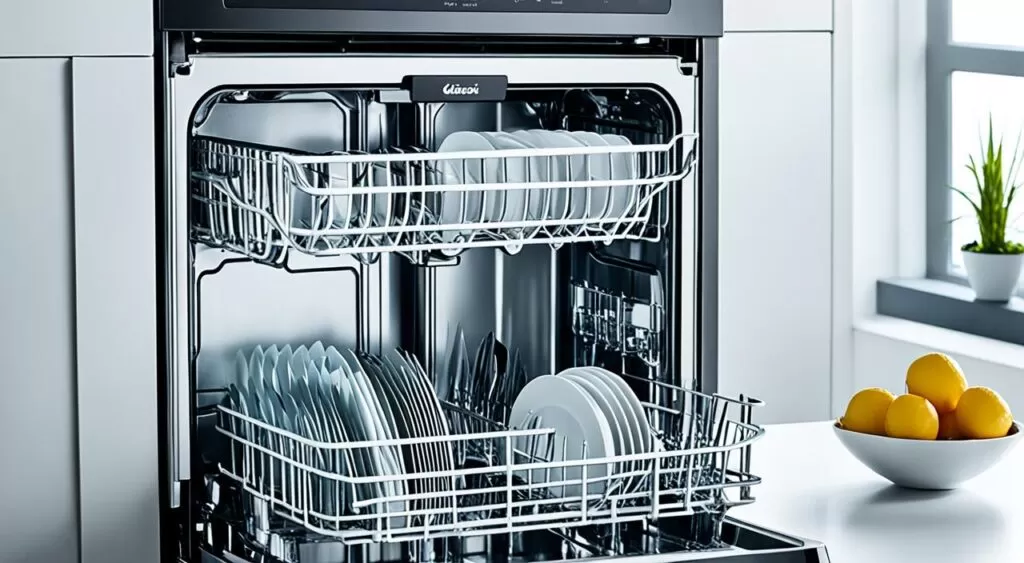
Cleaning the dishwasher filter is critical. Experts suggest doing this every three to six months. The exact timing depends on your usage and if you pre-rinse dishes. Vinegar and baking soda are great for a deep clean. They remove odors and cut through grease effectively.
Here’s a quick tip: For a deep filter clean, soak it in hot, soapy water for 20 minutes. Rinse and reinstall it properly for best results.
To tackle grimy gaskets, blocked spray arms, or bad smells, use cleaning vinegar or dishwasher cleaning tablets like Affresh Dishwasher Cleaner. Keep the dishwasher door open after use. This prevents mold and mildew.
| Cleaning Task | Product/Method | Frequency | Benefits |
|---|---|---|---|
| Overall Cleaning | Vinegar and Baking Soda | Monthly | Prevents detergent buildup, maintains performance |
| Filter Cleaning | Hot, soapy water soak | Every 3-6 months | Prevents food buildup, ensures efficient filtration |
| Deep Cleaning | Affresh Dishwasher Cleaner or similar | As needed during regular cycles | Removes buildup, freshens interior |
| Odor Removal | Running with vinegar on hottest setting | As needed | Eliminates smells, dissolves residues |
| Prevent Mineral Deposits | Dishwasher Salt | In hard water areas, as needed | Softens water, fights limescale |
Following these cleaning dishwasher tips will keep your appliance looking and working great. Products like Therapy Clean Stainless Steel Cleaner & Polish, Arm & Hammer Baking Soda, or Distilled White Vinegar are essential. They help in cleaning drain areas and gaskets, preventing mold and mildew. This keeps your dishwasher and dishes in top shape.
Preventing Dishwasher Residue: Best Practices
To prevent dishwasher residue and boost dishwasher efficiency, using the right care methods is key. These practices help keep the appliance looking and working perfectly. They also extend the life of your machine. Let’s see why the way you load and set your dishwasher matters a lot.
How to Load Your Dishwasher Correctly to Avoid Residue
To stop dishwasher residue, loading it right is crucial. Make sure nothing blocks the spray arms. This lets water and detergent clean every dish fully. By placing dishes properly and checking before you start, you avoid spots and films on them.
Optimizing Your Dishwasher’s Performance via Settings
Using your dishwasher’s settings wisely boosts dishwasher efficiency. High-temperature washes tackle tough dirt, and special cycles protect your glassware. Adjusting settings based on what you’re washing ensures top performance.
| Cleaning Frequency | Activity | Benefits |
|---|---|---|
| Daily | Remove stuck food from drain | Prevents residue build-up and clogs |
| Weekly | Clean exterior, particularly stainless steel | Staves off water stains and fingerprints |
| Every Few Weeks | Rinse dishwasher filter with hot water | Controls greasy buildup and enhances performance |
| Monthly | Run deep-clean cycle with vinegar and baking soda | Dissolves stubborn residues and neutralizes odors |
For a clean dishwasher, rinse before loading and use rinse aid. Regularly clean it with good detergent. Products like Affresh Dishwasher Cleaner Tablets are great for stopping dishwasher residue. They remove build-ups that can shorten your dishwasher’s life and lower dishwasher efficiency.
- The Water Hardness Impact: regions with harder water may require more frequent descaling.
- Filter Maintenance: a rinse with warm water to minimize grease accumulation.
- Disinfecting Wipes: optimal for a sanitized, bacteria-free exterior.
- Lifespan Maintenance: regular upkeep ensures your dishwasher operates like new for years to come.
How to Remove Hard Water Stains from Your Dishwasher
Keeping your dishwasher free from hard water stains is key for top performance and clean dishes. Homeowners use both DIY remedies and store-bought cleaners for a sparkling dishwasher and to stop residue. We’ll look at how each method helps keep your dishwasher looking great.
Home Remedies for Combatting Hard Water Stains
For DIY stain removal, distilled white vinegar is a top choice. Clean your dishwasher with vinegar once a month to break down minerals. Put 2 cups (500 mL) of vinegar in a bowl on the top rack, then run a hot cycle. Next, scatter a cup of baking soda at the bottom and run a quick cycle for a clean smell.
Also, soak the racks in warm, sudsy water and brush off stains with a soft brush. Beyond vinegar and baking soda, these steps help too.
- Soak sprayer arms in vinegar and warm water to remove food bits.
- Wipe the inside with baking soda paste or soapy water.
- Use a baking soda and vinegar mix to clean the drain and stop clogs.
- For mildew, use an ammonia and water mix on surfaces.
By sticking to these cleaning tips and following the manufacturer’s advice, you avoid hard water stains and keep your dishwasher running well.
Commercial Solutions for Sparkling Clean Interiors
If DIY solutions don’t work, try commercial cleaners like Affresh® to tackle limescale and buildup. These products, often in tablets, make cleaning deep. Follow the directions, especially when dishes are in the cycle. Place tablets in the soap tray or directly at the bottom, then start a hot cycle.
Always clean filters to prevent blockages, and polish the dishwasher’s outside from time to time. Clean thoroughly after washing non-dish items to prevent residue. To keep residues at bay, don’t overload and regularly clean the filter and sprayer arms.
A monthly cleaning plan using both DIY and commercial products will rid your dishwasher of hard water stains. Your dishes and glassware will shine. Following these steps ensures your appliance stays in excellent condition.
Maintaining Dishwasher Efficiency After Descaling
After descaling the dishwasher, it’s important to keep it running well. Adding simple steps to your routine can make a big difference. These steps ensure your dishwasher stays efficient.
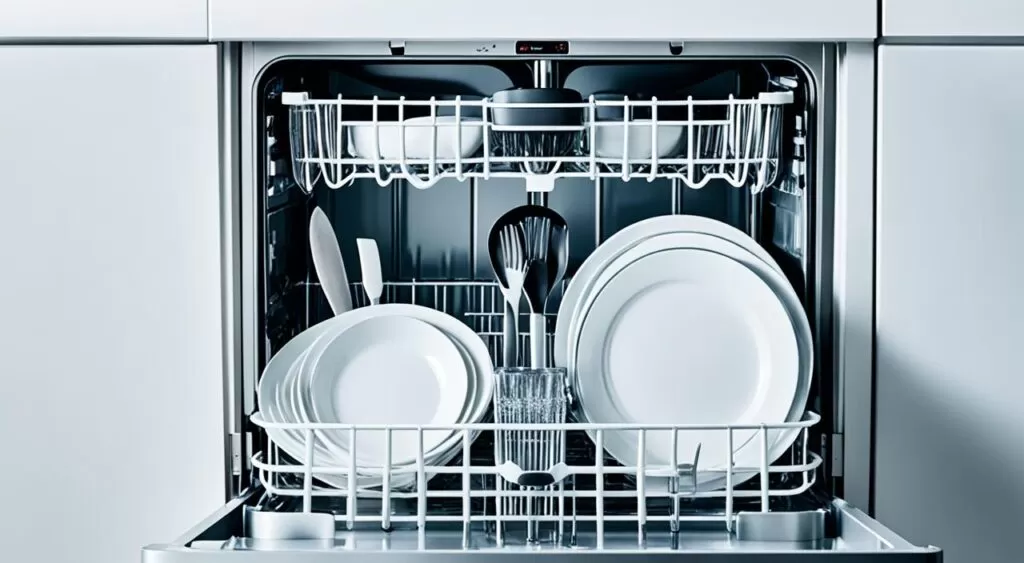
First, check the spray arms and filters regularly. Remove bits of food or other debris to keep water moving freely. This not only stops blockages but also means water spreads evenly in every cycle. A clean dishwasher leads to cleaner dishes.
Next, choosing the right detergent is crucial. Pick a detergent that’s best for your water type. Also, do an empty hot wash now and then. This wash can get rid of any left-over buildup from the descaling process.
- Inspect and clean spray arms and filters routinely.
- Choose high-quality detergents suitable for your dishwasher’s needs.
- Perform occasional hot wash cycles to remove lingering residues.
Keep doing these things to make sure your dishwasher works well. This way, you can avoid scale in the future. And you’ll know your kitchen’s dishwasher is running efficiently.
The Dos and Don’ts of Dishwasher Use for Maximum Longevity
Dishwasher maintenance and cleaning dishwasher tips help keep your appliance working well. Knowing the right and wrong ways to use your dishwasher means it will work better. This avoids expensive repairs and time without your dishwasher.
Looking after your dishwasher is more than just using it sometimes. It’s crucial to clean it deeply every 6-12 months to get rid of mineral and food build-up. Even if your dishwasher can check how dirty dishes are, you still need to clean it yourself sometimes.
You might think you should rinse dishes first, but you don’t need to. Modern dishwashers can clean dishes even with some food on them. Rinsing them off first can mess up the dishwasher’s sensors. Also, using the right soap is important to avoid damage.
Dishwashers can’t clean themselves. They might release rinse aids, but that’s not enough. Only 40% of people check the maintenance manual as they should. Following the manual’s advice can keep your dishwasher from getting damaged.
- Do: Run regular maintenance cycles.
- Do: Choose detergents carefully to protect your dishwasher.
- Do: Make sure dishes are spaced out so water can clean them well.
- Don’t: Put too many dishes in the dishwasher – this causes 30% of breakdowns.
- Don’t: Run it half-empty. This uses about 20% more water and power.
- Don’t: Use the hot cycle too much, as it could cause more breakdowns.
In this table, we share important tips for using your dishwasher wisely. By following these, you can keep it running smoothly and save resources.
| Aspect | Optimal Practice | Impact on Dishwasher |
|---|---|---|
| Load Monitoring | Avoid overloading | Prevents 30% potential breakdowns |
| Run Frequency | Run when full | Decreases water/electricity usage by 20% |
| Temperature | Maintain 180°F | Ensures effective cleaning |
| Hot Cycle Usage | Use sparingly | Reduces risk of mechanical issues by 15% |
| Manual Consultation | Regularly consult maintenance manual | 40% of commercial dishwasher owners adhere to this |
By following these tips, your dishwasher will work better and last longer. A well-kept dishwasher is more eco-friendly and saves you money in the long run.
Conclusion
Descaling the dishwasher plays a key role in making homes efficient and eco-friendly. Switching to electric dishwashers cuts down energy use, CO2 emissions, and costs a lot. Also, regular dishwasher maintenance makes them last longer and keeps dishes cleaner and more germ-free than washing by hand.
Using dishwasher cleaning hacks like the ECO setting and regular cleaning boosts its efficiency. Although some people are just starting to see how much resources dishwashers save, they truly make cleaning easier and save water. Dishwashers use much less water than washing dishes in the sink. Understanding this is crucial for choosing eco-friendly cleaning habits.
Keeping your dishwasher in top shape is not just about chores; it’s about making your home healthier and using resources wisely. Dishwashers are vital for cleanliness, lessening environmental harm, and introducing good bacteria to help kids’ immune systems. Here’s to clean dishes, saving resources, and getting back days spent on manual washing. Dishwashers clearly offer many benefits.
FAQ
How often should I descale my dishwasher?
You should descale your dishwasher every 3 to 6 months to keep it working well. In areas with hard water, you might need to do it more often.
What are the signs that my dishwasher needs descaling?
Signs include dishes not being clean, water spots on glassware, and limescale deposits. Reduced performance means it’s time to descale.
Can I use natural ingredients like vinegar to descale my dishwasher?
Yes, vinegar can remove scale buildup. Just place a cup of white vinegar on the top rack and run a hot cycle.
Are there specific descaling products I should use for my dishwasher?
Use dishwasher-specific descalers for hard water. They safely remove deposits without damaging your dishwasher.
How do I prepare my dishwasher for descaling?
First, empty it and remove any debris. Then, run a cycle without detergent to get it ready for descaling.
After descaling, how do I maintain my dishwasher’s efficiency?
Keep spray arms and filters clean, use good detergents, and occasionally run a hot cycle without dishes.
What are some effective dishwasher cleaning hacks?
A bowl of vinegar on the top rack can improve cleaning. Baking soda on the bottom helps with odors and grease.
What’s the correct way to load my dishwasher to avoid residues?
Don’t let dishes overlap or block the spray arms. Keep large items at the edges and ensure nothing hinders the detergent dispenser.
How do I optimize my dishwasher settings to get the best results?
Select settings that fit your load. Use hot wash or sanitizing cycles for dirty items, and choose the right cycle length.
What types of commercial descaling solutions are best for dishwashers?
Choose solutions labeled “dishwasher safe” or “for dishwashers.” Always follow the manufacturer’s directions.
How do I prevent hard water stains in my dishwasher?
Use rinse aids and keep the dispenser full. A water softening system can prevent stains and buildup.
What are the dos and don’ts for maintaining my dishwasher’s longevity?
Do run maintenance cycles, pick the right detergent, and unclog the machine. Don’t overload it, use the wrong detergent, or ignore upkeep instructions.
